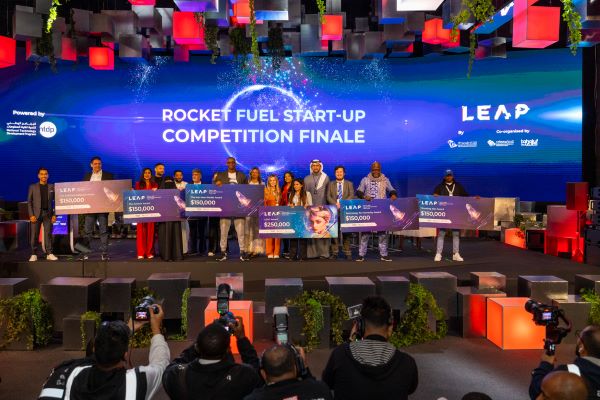
Saudi Arabia’s Plastus, which produces 100 per cent biodegradable bioplastics through the fermentation of bacteria, scooped the US$250,000 main prize at this year’s LEAP Rocket Fuel Startup Pitch Challenge, powered by Saudi Arabia’s National Technology Development Programme (NTDP), after wowing a star-studded judging panel in Riyadh.
Concluding on the final day LEAP23, the world’s most visionary technology event, the second annual LEAP Rocket Fuel Startup Pitch Challenge was a collaboration between the Kingdom’s Ministry of Communications and Information Technology (MCIT), the MiSK Foundation, and NTDP.
The Challenge saw 90 global startups whittled down to 12 finalists selected to pitch before a five-strong judging panel comprising Dragons’ Den stars James Caan and Steven Bartlett,Saudi angel investor Tala Al Jabri, Baroness Karren Brady CBE – aide to The Apprentice’s Alan Sugar – and Shark Tank India’s Ghazal Alagh.
Praising the assembled finalists for their innovative potential, Bartlett said: “I’m exceptionally inspired by both the diversity of the founders and the diversity of their teams. It’s really inspiring to see that, and I think their focus on diversity gives them a great chance to be successful.”
The Dragons’ Den star’s sentiments were echoed by Al Jabri, who added: “It’s been a real honour listening to all the pitches. It’s clear everyone put a lot of effort, heart, and soul into this process. It’s been a genuine thrill to watch, observe, and ask questions.”
In addition to Plastus sealing the main prize, Rwanda’s Bag Innovation secured the early-stage startup prize of US$150,000. Other prizes included the Aviatrix Award for most innovative startup pioneered by women, which went to Saudi Arabia’s Takadao; the Technology for Humanity Award won by Nigeria’s RiceAfrika; Wicrypt, also from Nigeria,taking home the most impressive startup in the Metaverse and Web 3.0 domains; and, finally, the UAE’s Verofax, which was recognised for the most ground-breaking use of Artificial Intelligence.
“This is so huge. It will make it possible to finish the entire retrofitting stage and make so much happen for us. I’m speechless,” said Plastus CEO Nouf Alhazmi, whose company produces bioplastics that fully break down in the environment in two months but have a shelf-life of two years.
The final day of LEAP23 also saw the US$532,000 Alibaba Cloud Saudi Hackathon winners announced. The four-day Hackathon took place from January 29 until February 1, with 25 teams receiving cash prizes ranging from US$6,667 to US$80,000. The grand prize was won by team JMM Innovations, who top-scored for their use of Alibaba Cloud technology to facilitate deployment, development, scalability, and fast go-to market solutions over numerous different scenarios.
For more information on LEAP, which is powered by MCIT in conjunction with Tahaluf – a strategic joint venture co-owned by InformaPLC and the SAFCSP – please visit https://www.onegiantleap.com












